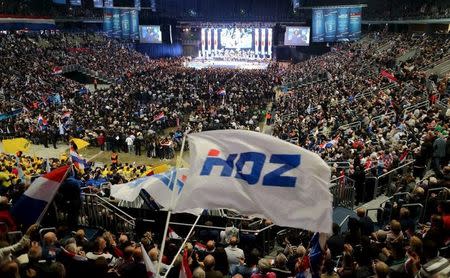Croatia holds parliamentary election, conservatives have narrow lead

By Igor Ilic ZAGREB (Reuters) - Croats began voting on Sunday in a parliamentary election, their first since joining the European Union in 2013, and the winner faces a tough task nurturing a fragile economic recovery and dealing with large numbers of migrants transiting the country. More than 6,500 polling stations opened across the country at 7 a.m. (0600 GMT) and will close at 7 p.m. (1800 GMT). The first, preliminary, official results will be released at 10 p.m. (2100 GMT). Opinion polls suggest the opposition HDZ-led Patriotic Coalition will win by a narrow margin of about five parliamentary seats, an outcome likely to entail lengthy coalition talks with smaller parties. The conservative Coalition favours a tougher stance than its main rival, the ruling Social Democrats, on the migrant issue, seeking stricter border controls to manage the flow of people crossing Croatia on their way to western Europe. More than 330,000 migrants have passed through Croatia since mid-September, part of an exodus of people fleeing conflicts and poverty in Syria, Iraq and beyond. The migrants have been crossing the border from Serbia at a daily rate of 5,000 or sometimes even 10,000, but few linger in Croatia, one of the poorest EU states where unemployment stands at 16 percent, well above the bloc's average of 9 percent. The nationalist-minded HDZ, which steered Croatia to independence from Serb-dominated Yugoslavia in 1991, has accused the centre-left government of Prime Minister Zoran Milanovic of being soft and ineffectual in handling the migrant issue. But political analysts say the HDZ, which plays on issues of national identity and family values in the mainly Catholic nation of 4.4 million people, may struggle to attract sufficient support from smaller parties to build a stable government. This could allow the Social Democrats to hold on to power even if they win fewer votes. "At the moment it is quite difficult to say which side will be favoured by the smaller parties," political analyst Viseslav Raos said. The Most party, which is Croat for "bridge", may, according to the opinion polls, emerge as the third strongest group in the parliament. The party, founded three years ago, says it will press for reforms of a bloated public sector and for a better business climate. Milanovic says his party deserves another four-year mandate because the economy, which is heavily reliant on tourism, has started to grow again after six years of recession that wiped out about 13 percent of national output. The HDZ says it can achieve much faster growth than the current one percent. "I would prefer the winner to be a party which would be firmly committed to pursuing reforms for better economic prospects, but I'm afraid there are still too many voters that stick to the two main parties," said 24-year student Romano Rilovic after casting his vote. (Edited by Robert Birsel)
